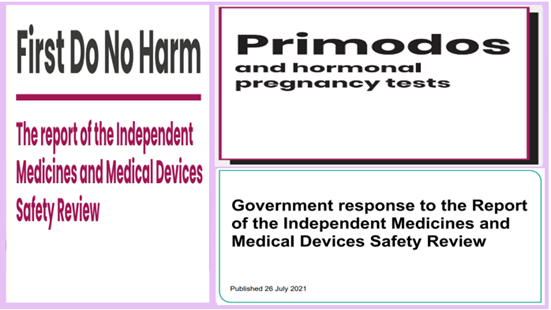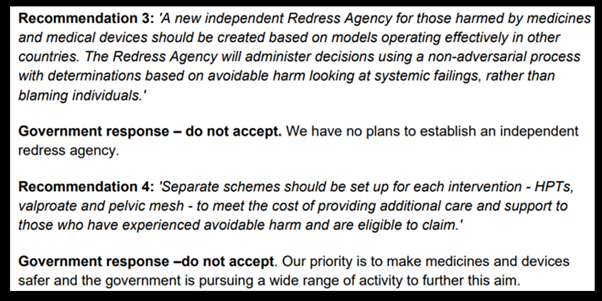Primodos: Financial redress is long overdue
In this article, Sharon Hartles reflects upon the events that have unfolded since the publications of the Independent Medicines and Medical Devices Safety Review, First Do No Harm report and the Department of Health and Social Care, Government response to the report of the Independent Medicines and Medical Devices Safety Review. She sheds light on the ongoing debacle over the government's pledge in fulfilling their policy recommendations. Sharon Hartles is a member of the Open University’s Harm and Evidence Research Collaborative.

Images adaption from sources: First Do No Harm report, Independent Medicines and Medical Devices Safety Review poster and the Government response to the report of the Independent Medicines and Medical Devices Safety Review
Following the publication of the First Do No Harm report (also known as the Cumberlege Review), Baroness Julia Cumberlege CBE, a life peer who chaired the Independent Medicines and Medical Devices Safety Review, stated “The first duty of any health system is to do no harm to those in its care; but I am sorry to say that in too many cases concerning Primodos, sodium valproate and pelvic mesh, our system has failed in its responsibilities.” Within hours of the report being released, on the 8th July 2020, the then Secretary of State for Health and Social Care Matt Hancock issued a full apology which met with Recommendation 1, the first of nine strategic recommendations set out in the First Do No Harm report. For Marie Lyon, Chairwoman of the Association for Children Damaged by Hormone Pregnancy Tests (ACDHPT) who has been campaigning for justice since 1978, the report content and acknowledgment triggered an emotive response. However, time would evidence that this initial euphoria was going to be replaced with a vehement sense of betrayal and a continuation of Primodos affected families campaigning for justice in the form of financial redress.
On the first anniversary of the publication of the First Do No Harm Report, in an Independent Medicines and Medical Devices Safety Review Debate, Nadine Dorries, Minister of State at the Department of Health and Social Care, expressed her sympathy to those who had been harmed. During this backbench debate which took place in the House of Commons, she announced that the government would not be implementing recommendation 3 or recommendation 4 as set out in the First Do No Harm report (see figure 1). This harmful decision not to implement these recommendations was confirmed on the 21st July 2021, in the Government response to the report of the Independent Medicines and Medical Devices Safety Review published by the Department of Health and Social Care.

Figure 1 - Extract from the Government response to the report of the Independent Medicines and Medical Devices Safety Review (p. 8)
Just as the government did not accept the recommendations for a Redress Agency and Separate schemes, those who have suffered and their families have decided not to accept the government’s response in regards to these recommendations. Marie Lyon voiced her reaction “Redress is the most powerful way of making amends and freeing our families from the financial burden they have carried and will continue to carry for many years to come”. Her disappointment was echoed in a Statement by Baroness Julia Cumberlege CBE and the Rt Hon Jemery Hunt MP “… we are deeply disappointed the government has rejected calls for an independent redress agency or any redress for families whose lives have been devastated by medicines or medical devices. For those families justice has not been done today.”
In addition to Baroness Julia Cumberlege CBE and Jemery Hunt MP, a wide array of parliamentarians continue to actively support the Primodos campaign for justice, including but not exclusive to: Lord David Alton MP, Former Prime Minister Theresa May, Sir Mike Penning MP, Hannah Bardell MP, Yasmin Qureshi MP, Emma Hardy MP, Sarah Green MP, Ed Davey MP, Yvonne Fovargue MP, Caroline Nokes MP, Sharon Hodgson and Allan Dorans MP.
On the 17th February 2022, a joint letter was written from Marie Lyon (ACDHPT), Kath Sansom (Sling the Mesh) and Emma Murphy and Janet William (In-fact), to Maria Caulfield MP, Parliament Secretary of State for Patient Safety and Primary Care. In this letter, these three campaign groups collectively called for the recommendations set out in the Independent Medicines and Medical Devices Safety Review to be implemented in full. It is clear that Primodos affected families will not give up on the anything less than justice, as recommended in the First Do No Harm report.
The personal testimonies which formed part of the evidence for the Independent Medicines and Medical Devices Safety Review from Nicky Gubbins, Daniel Mason, Linda Kelly, Christine Feltham, and the Bagley family, together with the personal testimonies of Chris Gooch, Jo Moreno and Margaret Roberts make visible social harm. A range of harms are evident including: physical, emotional and psychological, cultural and relational, and financial and economic. While some of these harms are readily apparent, others have unfolded over decades and will continue to do so. The health care system failed in its responsibility to prevent those in its care from being harmed. Despite being informed of this on the 8th July 2020, in the First Do No Harm report, it is now the government who is failing in its duty to do no harm, to those who are still suffering and their families.
Since the publication of the First Do No Harm report, 19 parents of children damaged by Primodos have died. In a Patient Safety Commissioner debate, which took place in the House of Lords, Lord David Alton concluded the parents died “while still worrying that their children would be left financially dependent on the state? They died in despair.” It is clear that the inaction of the government not to accept in full the recommendations set out in the Independent Medicines and Medical Devices Safety Review is exacerbating and prolonging avoidable harm which the government is now imposing onto Primodos affected families.
In the Government response to the report of the Independent Medicines and Medical Devices Safety Review, instead of implementing financial redress to those who were not protected by the health system, the government stated its ‘priority is to make medicines and devices safer and the government is pursuing a wide range of activity to further this aim’ (figure 1). It is important that the government have recognised that patients are the raison d'être of the health system. However, this should not be advocated as a priority at the expense of financially redressing those harmed and their families. The government does not need to make an either-or choice, both points are equally important and are not mutually exclusive. Make medicines and devices safer ‘and’ set up schemes to meet the cost of providing additional care to those who have been harmed.
The avoidable harms brought about due to systemic failure spanning decades, and which have led to a multitude of intergenerational harms, cannot be brushed aside under the old cliché that lessons have been learned by the government. Primodos affected families have fought tirelessly for many decades to have their voices amplified, to be heard, to be listened to, to be believed, to share their lived experiences. Justice in the form of financial redress is long overdue. The government should do no harm, but then do some good, not only for future patients of the health system, but also for those who have suffered because the health system failed in its duty and in its responsibilities to do no harm to those in its care.
If you wish to read more about this injustice, the following articles published by Sharon Hartles on the Harm and Evidence Research Collaborative blog may be of interest:
Primodos, Mesh and Sodium Valproate: Recommendations and the UK Government’s response
Primodos: The next steps towards Justice
Primodos: The first step towards Justice
